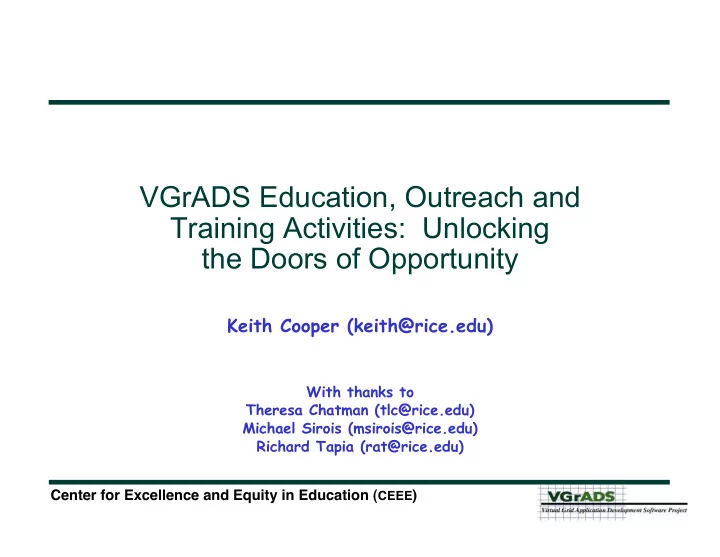

VGrADS Education, Outreach and Training Activities: Unlocking the Doors of Opportunity Keith Cooper (keith@rice.edu) With thanks to Theresa Chatman (tlc@rice.edu) Michael Sirois (msirois@rice.edu) Richard Tapia (rat@rice.edu) Center for Excellence and Equity in Education ( CEEE )
The Challenge for VGrADS EOT Injecting the topic of grid computing into a variety of technical venues to increase both participation and dissemination • Specific goals from the proposal — Significant presence at Grace Hopper & Tapia Celebrations — Support for AGEP students to work on VGrADS projects — Develop both general education & grid courses — Include VGrADS knowledge in ongoing efforts, such as CS-CAMP • With funded budget, are accomplishing most of our goals — $55,000 per year in EOT, + indirect funding in research budgets — Spending EOT budget to leverage existing, successful efforts – Drive grid subjects into those venues — Increased emphasis on collaboration & leverage – PIs work with other programs & seek institutional dollars
VGrADS EOT Philosophy • PIs are active in projects that span the educational pipeline — Pre-college students (CS-CAMP) — Undergraduate students (AGEP) — Graduate students (courses, student exchanges) • PIs are active in professional outreach activities — Both typical venues and special projects • Special attention to the needs of underrepresented groups — Minority Students in Majority Institutions — Direct attack on student attrition in science and engineering – Avoid “loss of the precious few”
Participation in Minority-Focused Conferences • 2004 Grace Hopper Celebration of Women in Computing, October 6-9, 2004, Chicago, IL — Supported travel for 6 students and 5 staff to conference – Financial help from CITI, CEEE, & Dean of Engineering — Panel on successful strategies for encouraging diversity (Sirois) — Student BOF on difficulties with achieving gender equity in CS • 2005 Richard Tapia Celebration of Diversity in Computing, October 19-22, 2005, Albuquerque, NM — Expect to support about 4 staff, 3 student travel – We hope to leverage these dollars & increase our presence — One or more PIs will give invited plenary talks — Sponsor a panel on grid computing chaired by VGrADS PI – Staffed with VGrADS personnel, including an AGEP student
Computer Science Computing and Mentoring Partnership (CS-CAMP) Project NSF-sponsored mentoring and support project to increase interest and retention of females in high-school computer science. VGrADS leverages CS-CAMP to extend its outreach. CS-CAMP leverages VGrADS to improve its content. • Summer 2004 CS-CAMP — Awareness Day Participation – “Computer Science—What is it?” (Cooper) – “Overcoming Obstacles” (Tapia) – Congressman Culberson Panel • Summer 2005 CS-CAMP — Grid Computing Session (Kennedy or Koelbel) — Career Choices in Computing (Kennedy or Koelbel) — Tapia and Cooper will speak, as in previous years
Alliances for Graduate Education and the Professoriate (AGEP) NSF-sponsored program that provides year-round support, mentoring, and community for students from underrepresented groups at both the undergraduate & graduate levels • AGEP Summer Program — Bring students to campus & pair them with senior researchers — Expose them to graduate-style education (& hook them) — Emphasis on community building & pyramid-style mentoring • Recruitment Efforts for 2005 — Over 100 applicants from CS, EE, and related fields – Nationwide recruiting effort — Expect three AGEP summer students to work with VGrADS – Evaluating scheduling methods – Launching Grid applications
VGrADS-related Courses • Graduate courses — UCSB (Rich Wolski) – CS 290I: Grid Computing – Students build & evaluate grid applications – Students use GrADSoft & VGrADS tools — UCSD (Andrew Chien) – CSE 225: Grids and High Performance Distributed Computing – Students learn about technical challenges in building grids, grid software, and grid applications – http://www-csag.ucsd.edu/teaching/cse225s05/ • General Education Course (Deferred) — Kennedy is developing a course on Information Technology Architectures; it will incorporate grid material
Graduate Students in VGrADS • Students are directly involved in the research — Participate in weekly planning calls, develop software, etc. — Attend & participate in annual VGrADS Workshop — Often give demonstrations at major conferences • Student exchanges — Student from one school spends significant time at another – Significant interchange of ideas & experiences – Started under GrADS – Anirban Mandal summer at USC ISI — Summer 2005 – Ryan Zhang (Rice) going to UCSD to collaborate on vgES – Dan Nurmi (UCSB) going to Rice to collaborate on delay prediction for scheduling [tentative]
Professional Outreach • “The usual” presentations at conferences, workshops, etc. — PIs give many grid-related keynote talks and invited talks • Website for disseminating results, internal collaboration — http://vgrads.rice.edu/ • SC2004 Conference activities — Exhibit floor talks/demos of VGrADS and GrADS activities (Johnsson, Dongarra, Kennedy, Koelbel, Wolski, various students) — PIs spoke in several BOF and Panel sessions • National Committees — CSTB Report “The Future of Supercomputing” (Koelbel, Dongarra) — PITAC subcommittee on Computational Science (Reed chairs) — Reed is CRA’s liaison to Coalition to Diversify Computing — Many national and international conference program committees
Summary Goal is to raise awareness of Grid issues, challenges and research by injecting it into high-impact venues • Strategy is to maximize impact through significant leverage — Work with successful, established programs – CS-CAMP, AGEP, Hopper & Tapia Conferences, SC — Seek institutional support for our programs — Integration of EOT & research expands reach of our budget • Broad commitment from PIs to make progress in education, outreach, and training — Funded activities, such as CS-CAMP & AGEP — Active participation in community-building,such as Hopper, Tapia, & SC Conferences — Act as catalysts for change at individual institutions
Recommend
More recommend